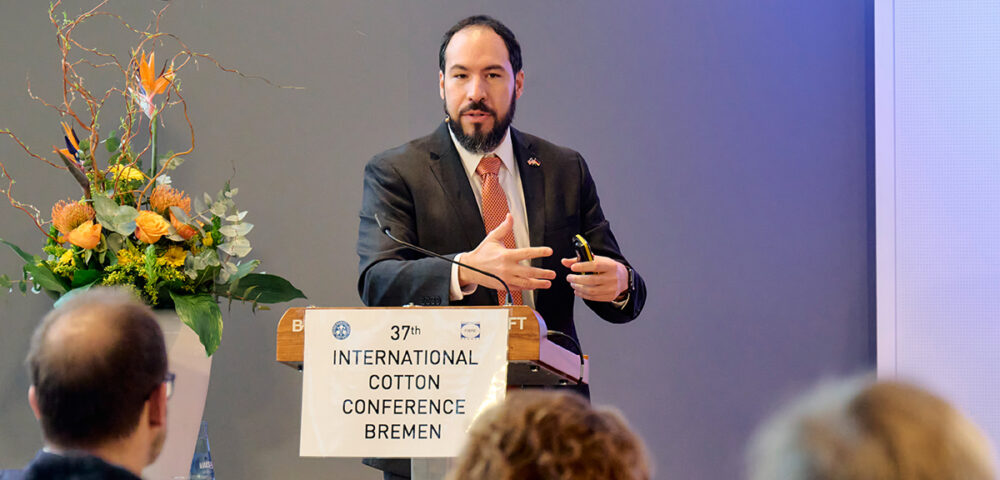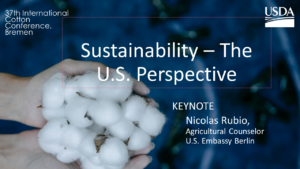– International Cotton Conference Bremen 2024 –
Nicolas Rubio is Agricultural Counselor of the USDA Foreign Agriculture Service at the U.S. Embassy in Berlin. At the beginning of his keynote at the International Cotton Conference Bremen in March 2024, Mr Rubio noted that research, innovation and regulation are topics on which USDA and farmers are focused.
The USDA strives to create a flexible and appropriate regulatory environment that allows farmers to achieve productivity goals. The United States is focused on climate-smart agricultural systems that can adapt to specific conditions using incentive-based approaches. He noted that increasing agricultural sustainability is a goal shared between the United States and the EU, but approaches differ. The U.S. emphasizes market-oriented and trade-facilitating policies within a rules-based multilateral trading system. Mr Rubio emphasized that governments must utilize all available tools to achieve sustainability objectives, with an emphasis on practicality.
An example of an emerging critical issue is the use of NGTs, New Genomic Technologies. The United States has used biotechnology for more than 25 years. The USDA is pleased to see that the EU is considering approval of NGT legislation to make tools available to farmers. The United States is concerned about EU regulations for responsible supply chains. The U.S. supports the objectives of the legislation, but there are concerns about implementation.
The U.S. is mainly concerned about EU textile and clothing policies, especially regulations that label products as sustainable, and how those definitions will be developed. Mr Rubio questioned how cotton will be labelled, given that it is a renewable, biodegradable and circular fiber. He reported that the US is spending 2.8 billion USD on 70 projects for climate smart commodities, including a grant of 90 USD million for the U.S. Cotton Trust Protocol. The USCTP establishes the U.S. as a leader in mitigating the impacts of climate change. As of 2024, approximately one-fourth of cotton area in the United States is enrolled in USCTP, with large reductions in soil loss and improvements in yields occurring.
Mr Rubio emphasized that voluntary, market-based approaches that encourage the achievement of pragmatic solutions to sustainable agriculture are preferable to other regulatory approaches.
In response to a question about positioning cotton relative to synthetics, Mr Rubio urged the cotton industry to do a better job of communicating the sustainability of cotton in the EU. Research is available, but more can be done to communicate well.
Mr Rubio emphasized that flexible policies are needed to ensure pragmatic achievement of sustainability goals. Policies apply worldwide, not just in the US and the EU, and he assured that U.S. policies reflect the concerns of all countries. He noted that some environmental regulations that require certification and traceability will exclude small holders, and he called for flexibility in regulatory approaches.
Link to the presentation of Nicolas Rubio : Sustainability – The U.S. Perspective


